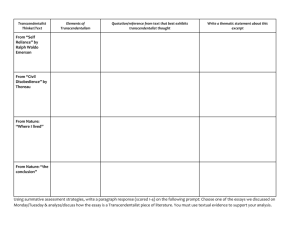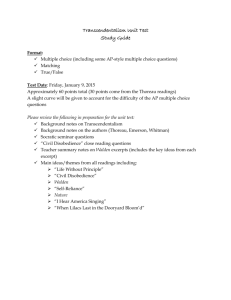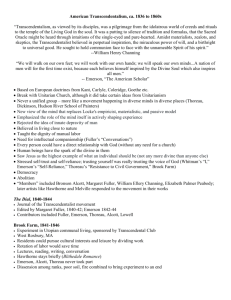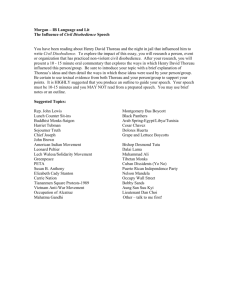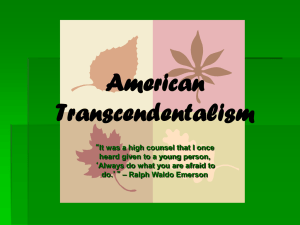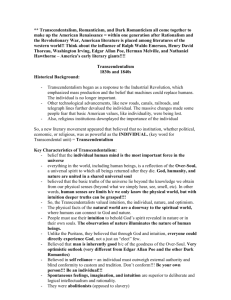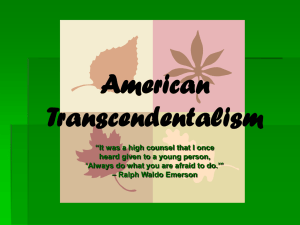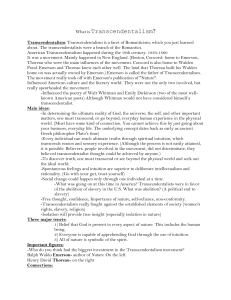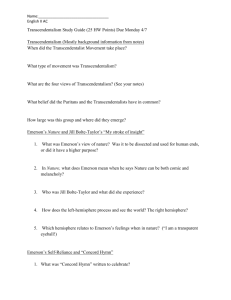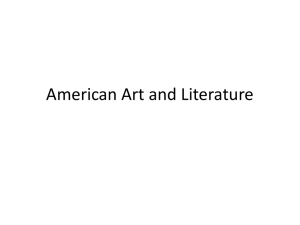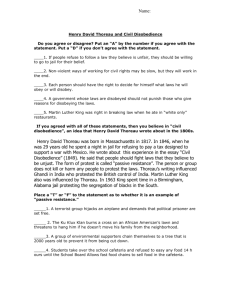American Literature and Arts
advertisement
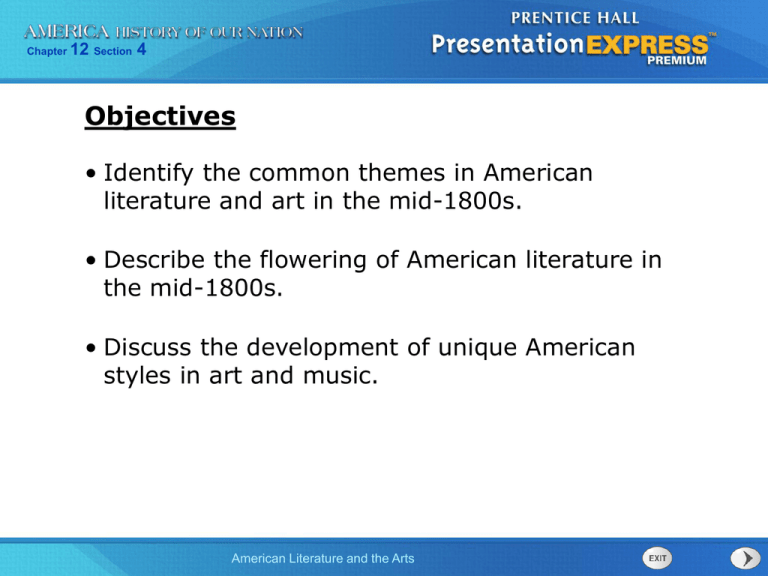
Chapter 12 Section 4 Objectives • Identify the common themes in American literature and art in the mid-1800s. • Describe the flowering of American literature in the mid-1800s. • Discuss the development of unique American styles in art and music. American Literature and the Arts Chapter 12 Section 4 Terms and People • transcendentalism – a movement that sought to explore the relationship between humans and nature through emotions rather than through reason • Ralph Waldo Emerson – the leading transcendentalist who wrote popular speeches and essays • individualism – the unique importance of each individual American Literature and the Arts Chapter 12 Section 4 Terms and People (continued) • Henry David Thoreau – a transcendentalist who wrote Walden • civil disobedience – the idea that people should peacefully disobey unjust laws if their conscience demands it • Herman Melville – author of Moby-Dick • Nathaniel Hawthorne – author of The Scarlet Letter • Louisa May Alcott – author of Little Women American Literature and the Arts Chapter 12 Section 4 Warm Up Questions: 1. What was the goal of the transcendentalism movement? 432 2. Give me one example showing how writers focused on American history. 434 3. What was a major topic of American paintings during this time period? 435 4. Before this time period, artists and authors were influenced by where, rather then American history and nature? American Literature and the Arts Chapter 12 Section 4 How did American literature and art have an impact on American life? Americans were divided by sectionalism and slavery, but they were united by nationalism and an optimistic belief in the possibility of improving themselves and society. These ideas were expressed in and reinforced by American art and literature. American Literature and the Arts Chapter 12 Section 4 Before 1800, American writers and artists modeled their work on European styles. They used formal language and referred to Greek and Roman myths. However, by the mid1800s, American writers and artists had begun to develop styles that reflected American optimism and energy. Their work explored subjects that were uniquely American. American Literature and the Arts Chapter 12 Section 4 Washington Irving Stories • “The Legend of Sleepy Hollow” • “Rip Van Winkle” Famous character • Rip Van Winkle was a lazy farmer who slept through the American Revolution. Inspiration • Dutch history of New York American Literature and the Arts Chapter 12 Section 4 James Fenimore Cooper Novels • The Deerslayer • The Last of the Mohicans Famous character • Natty Bumppo was a frontiersman who kept moving westward and criticized the destruction of nature. Impact • Cooper’s novels helped American literature gain popularity in Europe. American Literature and the Arts Chapter 12 Section 4 By the early 1800s, a new artistic movement called Romanticism took shape in Europe. Romantics emphasized the importance of nature, emotions, and imagination. A small but influential group of writers and thinkers in New England developed an American form of Romanticism. American Literature and the Arts Chapter 12 Section 4 This movement was called transcendentalism, and its goal was to transcend human reason. Transcendentalists argued that humans should pursue a close link with nature and live simply. Humans Humans seeking beauty, goodness, and truth within their own souls. American Literature and the Arts Nature Chapter 12 Section 4 Ralph Waldo Emerson, the leading transcendentalist, wrote speeches and essays in which he urged Americans to: • question the value of material wealth, and pursue higher values instead. • rely on principles of individualism to guide their lives and improve society. American Literature and the Arts Chapter 12 Section 4 The transcendentalist Henry David Thoreau: • spent two years living in the woods at Walden Pond, meditating on nature. • published Walden, a book in which he urged Americans to live simply. American Literature and the Arts Chapter 12 Section 4 Like Emerson, Thoreau believed people must judge right and wrong for themselves. He encouraged civil disobedience and once spent a night in jail for refusing to pay taxes that he felt supported slavery. Thoreau’s ideas about civil disobedience and nonviolent protest influenced later leaders like Martin Luther King, Jr. American Literature and the Arts Chapter 12 Section 4 Two later novelists, who were both fascinated by psychology and extreme emotions, began to change the tone of American literature. Today, Moby-Dick is considered one of the greatest American novels. American Literature and the Arts Herman Melville’s 1851 novel, MobyDick, told the story of a sea captain who destroys himself during an obsessive search for a white whale. Chapter 12 Section 4 American Literature and the Arts Chapter 12 Section 4 Nathaniel Hawthorne often used historical themes to explore the dark side of the mind. • In his 1850 novel, The Scarlet Letter, a young Puritan minister is destroyed by secret guilt. • Hawthorne—who was descended from the Massachusetts Puritans—paints a grim picture of Puritan life. American Literature and the Arts Chapter 12 Section 4 American Literature and the Arts Chapter 12 Section 4 Louisa May Alcott presented a gentler view of New England life in her 1868 novel Little Women, a story about four sisters growing up together. • The novel’s main character, Jo March, was one of the first young American heroines portrayed as a real person rather than as a shining ideal. American Literature and the Arts Chapter 12 Section 4 Poets of Democracy Henry Wadsworth Longfellow • Longfellow based poems, such as “Paul Revere’s Ride,” on American history. Walt Whitman • In books of poetry such as his 1855 Leaves of Grass, Whitman is seen as the poet who best expresses the democratic American spirit. • “The Song of Hiawatha” was one of the first works to honor Native Americans. Frances • Harper and Whittier wrote poems that Watkins described and condemned the evils of Harper and slavery. John Greenleaf Whittier American Literature and the Arts Chapter 12 Section 4 After 1820, American artists turned away from European themes and focused on American landscapes. Kindred Spirits, Asher B. Durand American Literature and the Arts Chapter 12 Section 4 The Hudson River School was a group of artists who painted scenes of the Hudson River valley. Thomas Cole and other painters of this school sought to stir emotions with the beauty of nature. American Literature and the Arts Chapter 12 Section 4 Other American painters were inspired by the daily lives of common Americans. • George Caleb Bingham painted scenes of life on the great rivers. • George Catlin captured the ways and dignity of Native Americans. American Literature and the Arts Chapter 12 Section 4 Just as art and literature shifted away from European themes, American songs also drifted away from English, Irish, or Scottish tunes. Over time, there emerged a wide variety of new American songs such as work songs and spirituals. The most popular American songwriter of the 1800s was Stephen Foster, composer of “Camptown Races.” American Literature and the Arts Chapter 12 Section 4 Close Questions: 1. What is Civil Disobedience? 2. How did the idea of Civil Disobedience influence Martin Luther King Jr.? American Literature and the Arts Chapter 12 Section 4 Section Review QuickTake Quiz Know It, Show It Quiz American Literature and the Arts
